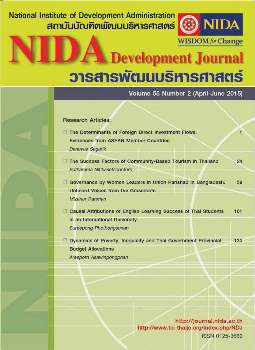The Success Factors of Community-Based Tourism in Thailand
Main Article Content
Abstract
Community-based tourism (CBT) is tourism in which local people enhance their involvement and participation in tourism planning and development in their areas, having positive impact on social, economic, and environmental conditions of their communities. The popularity of community-based tourism has grown with the government, private sectors, and in academia as part of the strategies for conservation of natural resources and development in Thailand.
Most research conducted in community-based tourism has focused exclusively on selective success factors, particularly community involvement and participation. However, collaboration at the community level is not the only factor contributing to the success. The research provides a comprehensive analysis of the relevant factors contributing to community-based tourism success by comparing the two best examples of implementation, namely at Sam Chuk 100-year-old market Suphanburi province and Klong Suan 100-year-old market, Chachoengsao province.
The objectives of the research are: (1) study community-based tourism, the importance and potential effects of tourism, and the characteristics of success (2) analyze the determinants of success of community-based tourism perceived by community members by comparing the two best examples, namely Sam Chuk and Klong Suan markets, and (3) provide policy recommendations for community-based tourism in Thailand. The success factors, including participation in decision-making processes, local ownership, local innovation, collective responsibility, sharing of resources, sharing of benefits among members, leadership and management, partnership and outside support, achieving authenticity, and achieving distinction, are used as criteria to determine the success factors of the two communities.
The research found that the success factors of community-based tourism in Sam Chuk and Klong Suan markets are different. Participation in decision-making processes, local ownership, collective responsibility, sharing of resources, leadership and management, achieving authenticity, and achieving distinction have a statistically significant effect on the success of community-based tourism for the Sam Chuk traditional market, while other factors, such as local innovation, have no statistically significant relationship with its success. On the other hand, participation in decision-making processes, local ownership, collective responsibility, leadership and management, partnership and outside support, achieving authenticity, as well as achieving distinction are the determinants of success of community-based tourism in Klong Suan old market. Other factors, such as sharing of resources, revealed no statistically significant effect on the community’s success. The results of the research contribute to policy development of community-based tourism in Thailand.

